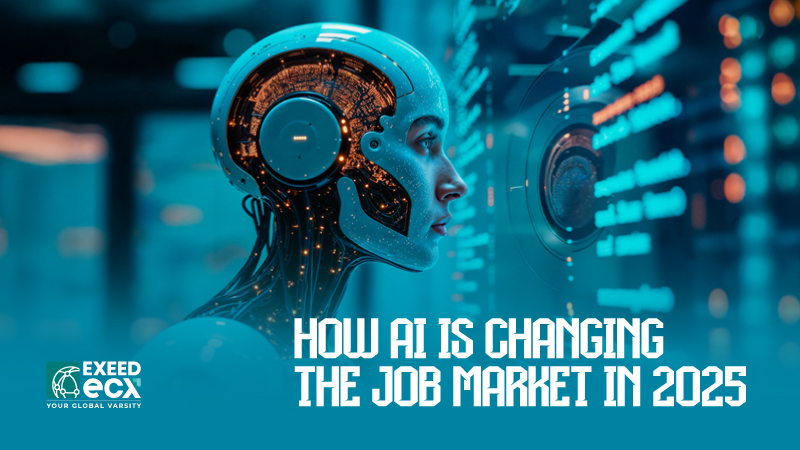
In 2025, AI is reshaping the job market in ways we’re just beginning to understand, bringing with it both exciting opportunities and critical challenges.
For professionals, students, and business owners alike, understanding AI’s impact is key to staying relevant and prepared in this fast-evolving landscape.
As we stepped into the Fourth Industrial Revolution, artificial intelligence emerged as a driving force behind technological transformation.
The Forum’s Future of Jobs Report 2025 shows that 40% of employers anticipate reducing their workforce in areas where AI is capable of automating tasks.
Let’s learn how AI is transforming jobs, what the figures tell us, and how you can future-proof your own career in the age of AI.
According to the Future of Jobs report by the World Economic Forum, AI and automation are expected to displace 85 million jobs globally by 2025; but at the same time, they’re predicted to create 97 million new roles. This shift underscores an important truth: AI is changing jobs, not just eliminating them.
Roles that involve manual, repetitive tasks like data entry, basic accounting, or customer support are increasingly automated.
Sectors most at risk include manufacturing, administrative roles, and jobs involving repetitive or predictable tasks. For instance, by 2025, two million manufacturing positions could be replaced by automation and AI-driven tools.
Industries with greater AI adoption experience revenue per employee growth that is 3X higher than those with lower exposure.
However, AI is also fuelling demand in areas like data science, digital marketing, software development, and ethical governance. These new roles often require advanced technical skills, such as AI engineering, data science, and machine learning, as well as emerging positions like AI trainers, algorithm auditors, and data labelers.
Many job titles that existed a decade ago have evolved or become obsolete. At the same time, new positions that never existed a few years back such as AI Trainer, Prompt Engineer, and AI Ethicist are coming into play.
Even conventional occupations such as HR or marketing are getting combined with AI. Marketers, for example, must learn how to apply AI tools to content generation, audience segmentation, and automated campaign management.
Related: Top 10 fastest growing jobs over the next decade
Interestingly, as automation acquires repetitive work, soft skills are more valuable than ever. Jobs that involve creativity, emotional intelligence, problem-solving, and adaptability are growing at lightning speed.
Why? Because even though AI can write a blog or create a report, it can’t replace human empathy, leadership, or nuanced judgment yet.
In today’s workplace, it’s less about competing with AI and more about collaborating with it. Tools like Microsoft Copilot, ChatGPT, and Notion AI are helping professionals write emails, generate insights, and even write code.
In a report by Forbes, close to 80% of employees who utilised AI platforms said they saw improved productivity, especially with writing aid, automation of workflows, and data analysis.
This collaborative approach means that rather than making humans obsolete, AI is often becoming a powerful teammate—handling data-heavy, repetitive work and freeing people to focus on creative, strategic, or interpersonal tasks.
Some sectors are experiencing more disruption and possibility than others. Here is where the biggest changes are occurring:
With technology moving faster than ever, lifelong learning isn’t a choice but it’s a necessity.
Governments and businesses are beginning to respond. In the UK, for example, the Department for Education launched its Skills Bootcamps free training in tech and digital skills designed to meet the demand for AI-ready talent.
At the same time, companies like Amazon and Google are investing billions to train their current employees, realising that the best talent may already be in their teams.
As per the World Economic Forum, the most rapidly increasing skills are AI-based data analysis, networking and cyber security, and technological skills.
Ready to future-proof your career? Discover industry-leading upskilling programs at Exeed ECX and get one step closer to an AI-resilient future.
Not at all. Many professionals are transitioning into AI and data-driven roles later in their careers. Programmes like the Master of Artificial Intelligence and Machine Learning are designed for working adults, making the shift achievable.
No. Though AI will automate some work, it will also produce new jobs. Human judgment, creativity, and emotional intelligence will never go out of fashion.
AI, machine learning, data analysis, cloud computing, and cybersecurity skills are in great demand. Analytical thinking, flexibility, and digital literacy are also becoming essential in all industries.
Begin with developing digital literacy and soft skills. Take courses, participate in webinars, or pursue online degrees from established universities to be at the forefront of the job market.
Read: The Transformative Power of AI in Education: A Comprehensive Look